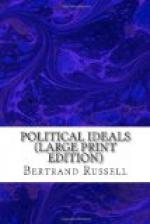In all that concerns possession and the use of force, unrestrained liberty involves anarchy and injustice. Freedom to kill, freedom to rob, freedom to defraud, no longer belong to individuals, though they still belong to great states, and are exercised by them in the name of patriotism. Neither individuals nor states ought to be free to exert force on their own initiative, except in such sudden emergencies as will subsequently be admitted in justification by a court of law. The reason for this is that the exertion of force by one individual against another is always an evil on both sides, and can only be tolerated when it is compensated by some overwhelming resultant good. In order to minimize the amount of force actually exerted in the world, it is necessary that there should be a public authority, a repository of practically irresistible force, whose function should be primarily to repress the private use of force. A use of force is private when it is exerted by one of the interested parties, or by his friends or accomplices, not by a public neutral authority according to some rule which is intended to be in the public interest.
The rgime of private property under which we live does much too little to restrain the private use of force. When a man owns a piece of land, for example, he may use force against trespassers, though they must not use force against him. It is clear that some restriction of the liberty of trespass is necessary for the cultivation of the land. But if such powers are to be given to an individual, the state ought to satisfy itself that he occupies no more land than he is warranted in occupying in the public interest, and that the share of the produce of the land that comes to him is no more than a just reward for his labors. Probably the only way in which such ends can be achieved is by state ownership of land. The possessors of land and capital are able at present, by economic pressure, to use force against those who have no possessions. This force is sanctioned by law, while force exercised by the poor against the rich is illegal. Such a state of things is unjust, and does not diminish the use of private force as much as it might be diminished.
The whole realm of the possessive impulses, and of the use of force to which they give rise, stands in need of control by a public neutral authority, in the interests of liberty no less than of justice. Within a nation, this public authority will naturally be the state; in relations between nations, if the present anarchy is to cease, it will have to be some international parliament.




